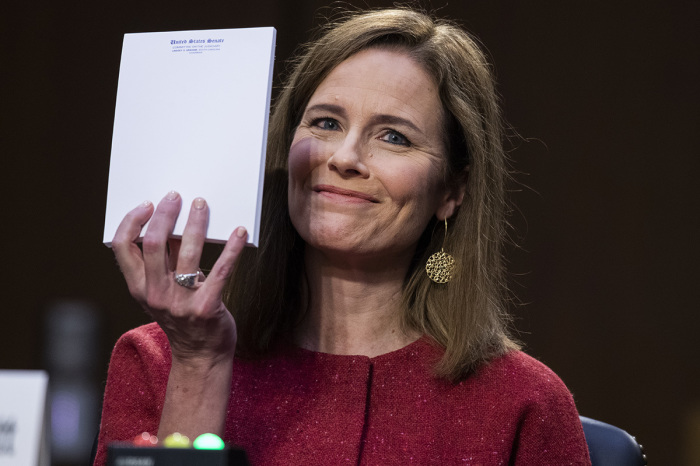Senate panel votes to advance Barrett's nomination

The Senate Judiciary Committee voted to advance the Supreme Court nomination of Judge Amy Coney Barrett to the full Senate Thursday despite a boycott from all 10 Democratic members of the committee.
All 12 Republicans on the committee voted to advance Barrett’s nomination. Rather than appear at the confirmation vote, the Democrats on the committee put pictures of Americans who benefitted from the Affordable Care Act in their places, reinforcing their narrative that Barrett’s presence on the high court would put the 2010 healthcare law in jeopardy.
Senate Democrats have criticized the confirmation process from the beginning. They have contended that a vote on a Supreme Court nominee should wait until after the presidential election since the death of Ruth Bader Ginsburg, which caused a vacancy on the court just one and a half months before the 2020 presidential election.
They have repeatedly referenced Republicans’ refusal to hold confirmation hearings for former President Barack Obama’s Supreme Court nominee Merrick Garland because it was an election year as the justification for their actions.
Sen. Dianne Feinstein, D-Calif., the ranking member of the Senate Judiciary Committee, expanded on this point of view during a press conference that she and her colleagues held in lieu of participating in the confirmation vote. After claiming that Republicans on the committee “broke the rules” by “proceeding today without any Democrats present,” Feinstein maintained, “All along, Democrats have objected to proceeding on this nomination in the middle of an election.”
“40 million Americans have already voted and we’re just 12 days from an election,” she said. “In 2016, the Republicans set a precedent against filing a Supreme Court vacancy in an election year when they blocked President Obama’s nominee Merrick Garland for 10 months before that election. Then, in 2016, Republicans said it was necessary to hold the nomination until after the election in order to give the American people a voice at the ballot box.”
Feinstein quoted Senate Majority Leader Mitch McConnell, who said, “The American people should have a voice in the selection of their next Supreme Court justice. Therefore, this vacancy should not be filled until we have a new president.”
Feinstein invoked the adage “what’s sauce for the goose is sauce for the gander” before lamenting that “Republicans are proceeding regardless.” She spent the rest of her remarks highlighting the “risks” she and Democrats believed Barrett’s confirmation would pose to Americans, specifically regarding “the Affordable Care Act, reproductive freedom, the right to vote and equality for all.”
“We believe that both the Affordable Care Act and Roe v. Wade could be lost,” she warned. She promised that Democrats would “continue to make the case about what’s at stake for the American people if Judge Barrett is confirmed.”
Sen. Kamala Harris, D-Calif., the Democrats’ vice presidential nominee and a member of the Senate Judiciary Committee, took to Twitter Thursday to explain why she and her colleagues boycotted the committee vote. “This nomination process is a sham and shows how Republicans will stop at nothing to strip health care from millions of Americans with pre-existing conditions,” she wrote.
My Democratic Senate colleagues and I boycotted the Supreme Court nominee committee vote today. Let's be clear: this nomination process is a sham and shows how Republicans will stop at nothing to strip health care from millions of Americans with pre-existing conditions.
— Kamala Harris (@KamalaHarris) October 22, 2020
In response to the boycott, U.S. Senate Majority Leader Mitch McConnell denounced the Democrats' "temper tantrum" and said their "anger and false statements have failed to persuade the Senate" as well as the American people.
Sen. Lindsey Graham, R-S.C., chairman of the committee, has argued, “There is nothing unconstitutional about this process.”
Regarding Obama's nominee, Merrick Garland, Graham pointed out, “There’s never been a situation where you had a president of one party and the Senate of another where the nominee of the replacement was made in an election year” in more than 100 years.
Liberty Counsel Chairman Mat Staver praised the decision to advance Barrett's nomination. “She will serve our nation well as an originalist who applies the intent and text of the Constitution and the laws she reviews," he said in a statement.
The full Senate is expected to vote on Barrett’s confirmation Monday. The Republicans have a 53-47 majority in the upper chamber, meaning that they can afford to lose the support of three Republicans and still have the votes to confirm Barrett without picking up votes from any Democratic senators. In the event of a 50-50 tie, Vice President Mike Pence would cast the tie-breaking vote.
Sen. Susan Collins, R-Maine, has already said that she would not vote for Barrett, citing her decision as a “comment on the process of rushing through a nomination in such a short time before the election.”
Sen. Lisa Murkowski, R-Alaska, has agreed that “we shouldn’t be taking this up until after the election” but it remains to be seen whether or not she will vote for Barrett. Sen. Mitt Romney, R-Utah, a frequent critic of the president who said he did not vote for him in the 2020 presidential election, announced last week that he would vote to confirm Barrett.
Should Barrett be confirmed, as is expected, she would become the fifth woman appointed to the Supreme Court overall and the second woman appointed by a Republican president. Her confirmation would make President Donald Trump the first president since Ronald Reagan to nominate more than two Supreme Court justices.




























